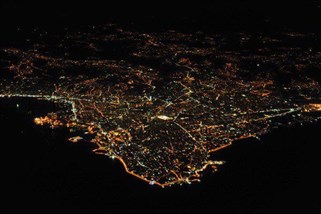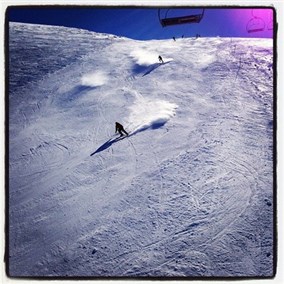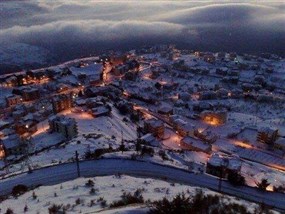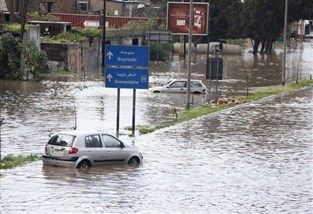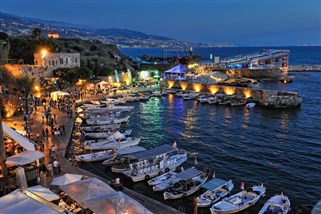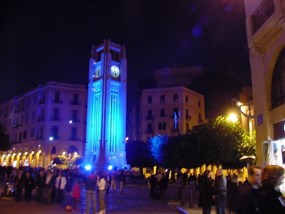Beirut. It’s one of the oldest cities in the world and was, for a period, considered to be the Paris of the Middle East. These days, it is affectionately referred to as “Bey,” and, quite frankly, resembles Miami by way of Portland more than it does the City of Light. Despite ongoing political turmoil, Beirut remains a hub for Levantine history combined with stunning juxtapositions: green hills, a sea-cradled peninsula, labyrinthine streets, neglected architecture—from Arabesque to Venetian Gothic—high-rises, old mosques, churches and palaces, and much more. Add to this a sociocultural melting pot, teeming with makers, doers, and shakers. The result is a perfect storm of shopping, wining, dining, dancing, and—eventually—sleeping in this capital city where the Mediterranean meets the Middle East.
 .
.
Friday
Upon arrival, check into the Baffa House. This privately owned, four-bedroom guesthouse is located in the lively neighborhood of Mar Mikhael. The yellow 1940s building is on a quiet side street and provides a convenient location for exploring both Mar Mikhael and neighboring Gemmayzé on foot. Baffa is comfortable and fresh, with a mix of colorful art and antique furniture. Samer, the owner, will gladly help with everything from recommendations for taxis to restaurant reservations.
 .
.
Get your bearings over lunch in the jasmine-scented garden of Makan, located on the ground floor of Baffa House. For lunch, Makan serves a vegetarian-friendly Lebanese and Sri Lankan lunch buffet. Sister restaurant Motto, located a few blocks away, also specializes in approachable international cuisine. For dinner, Makan hosts chefs for three nights at a time—currently Persian and Italian—while Motto is an incubator for new chef talent. Both offer customers the unique possibility to “pay what they think is fair” for their meals.
 .
.
Next, by taxi or with map on foot and with sunscreen in hand, head over to the recently reopened Sursock Museum. Housed in one of the rare remaining Italianate-style mansions from the early 1900s, the museum houses more than 800 works of Lebanese and international modern and contemporary art.
While in the neighborhood, check out the attractive tableware and home accessories at the playfully named The Silly Spoon; furniture, lighting, and more decorative items at Over the Counter; and a cold press and souvenir bottles of local neroli and rose hydrosols at reputable organic shop A New Earth.
Green juice at the ready, get onto the mat. There are no excuses—Union Square Yoga, one of Beirut’s top studios, is just a few blocks away. In 2005, Danielle Abisaab left her career in architecture to “temporarily” teach within the budding Beirut yoga community. More than a decade later, the studio that she founded in the heart of chic Ashrafieh has an extremely devoted sangha and offers classes like pop and rock vinyasa, jivamukti yoga, aerial yoga, plus dance and music workshops. Indefatigable Abisaab, or Yoga Holic as she is known on social media, also works with refugee teens to teach them yoga asanas and breath work.

What goes with wellness? Wine, of course. On the way back to Baffa, stop by Zawya for a glass, or bottle, of wine. This new shop serves only Lebanese wines, from small- and medium-size wineries.
Friday night is the night for seaside dining at Lux. Think: Mediterranean specialties like grilled octopus; white fish carpaccio; and seasonal, organic salads and sides. Cocktails are the way to go, and the DJ will get you warmed up for subsequent drinks and dancing at the weekly summer Decks on the Beach party at venerable institution Sporting Club.
Saturday
On Saturday morning, enjoy the tasty homemade Lebanese breakfast at Baffa House, but don’t overdo it . . . there will be samples galore at the Souk el Tayeb (literally “good market” in Arabic), Lebanon’s first farmers’ market. Created in 2004 by former journalist and food activist Kamal Mouzawak and held every Saturday at the Beirut Souks from 9:00 a.m. to 2:00 p.m., this market is an indispensable stop not only for the food, but also as evidence of the traditions and hospitality that unite the region’s otherwise fractured communities.
After the market, detour over to boutique-cum-atelier Orient 499, arguably the best place in Beirut for high-end furniture, clothing, and accessories from Lebanon, Syria, Morocco, and beyond.
Spend the rest of the morning exploring the charming cobblestone streets of Saifi Village, the Beirut arts district. Bokja is a must for brightly colored, textured furnishings and pillows handmade by local artisans. Be sure to also check out the sleek and chic contemporary designs of Lebanese-born, Japanese-raised interior designer Nada Debs.
In case you want to work up an appetite, Saifi Village also houses the city’s first spin and TRX studio, Exhale.

No trip to Beirut would be complete without a leisurely lunch in the garden terrace at Al Falamanki. This history-filled restaurant is open 24 hours a day, seven days a week, serving Middle Eastern food in an authentic atmosphere animated by backgammon games and live music.

After lunch, taxi back to Mar Mikhael and explore the shops and galleries on foot. Some favorites include: Zawal for soaps, pottery, and competitively priced textiles; art by local creatives at the adjoining gallery space Plan BEY; vintage atPink Henna; and Vanina for local fashion and jewelry (also sold internationally at Anthropologie, Yoox.com, and Ahalife).

Stay local for dinner at the brand-new Baron. The staff is mustached and interiors stylish. Chef Athanasios Kargatzidis’s modern Mediterranean cuisine is reminiscent of Ottolenghi’s NOPI in London in that the flavors and ingredients combine in creative ways without overwhelming. Highlights include roasted cauliflower with shawarma spices and tahini; octopus with sumac and green olive tapenade; and pork ribs with sake, miso, and tamari. Both the cocktails and wines, like the Ixsir Altitudes, are remarkable.
After dinner, don’t miss the CU NXT SAT party at neighboring—and legendary—underground club B018.

Sunday
If for any crazy reason you were early to sleep and early to rise, get in an early-morning workout at Athletes Anonymous. It’s a block away from Baffa and is configured like a playground, with a climbing wall, running track, and monkey bar circuit as well as fun group classes such as Brazilian Butt and pole fitness. There is also an on-site juice, smoothie, and supplement bar.

No weekend would be complete without Sunday brunch at Liza and Ziad Asseily’s Restaurant Liza. Located in the heart of Ashrafieh, the sprawling 5,000-square-foot eatery owes its impeccable decor to Lebanese globe-trotter Maria Ousseimi. The signature cuisine is refined Lebanese, and the Sunday brunch buffet is both generous and sophisticated. And it’s extremely Instagrammable. Straight from brunch, head to Lazy B. Let Liza book a taxi to drive you south 20 minutes, past the banana fields, to this 320,000-square-foot garden with three freshwater swimming pools, lounge chairs, umbrellas, and sandy dunes situated on a coast of protected creeks.

Sundays are slow in Beirut, so take your time getting back to the city (it will also help avoid traffic). For a casual dinner, try Mayrig in Gemmayzé for traditional Armenian mezzes. If your mood is more festive, book a spot on the rooftop of upscale Capitole restaurant and lounge for a night of cocktails and light bites like tuna tartare and carpaccio.

Monday
Stop by Papercup shop for one of the best cappuccinos in town and to stock up on reading material from its impressive selection of books and magazines.
Go for lunch at nearby Tawlet, the farmers’ kitchen component to the Souk el Tayeb market. Each day, the food is prepared by a different cook from a different area in order to celebrate local traditions. Tawlet’s profits directly support farmers, cooks, and producers.
For dessert, don’t miss out on tasting the 50-odd flavors of artisanal ice cream and sorbet at Oslo. Greatest hits include Mariage Frères tea, rose-loukoum, pistachio-halva, and pomegranate. There are also cookies and cakes of various sizes available to go. Hint: They are good for gifting.

Physical appetites satisfied, don’t miss the Beirut Art Center for another kind of sensory experience. Cocurated by the Centre Pompidou’s Marcella Lista and BAC director Marie Muracciole, the current exhibition, “Esma’/Listen,” is comprised of works and live performances by artists and composers resulting in an interactive exploration of sound and forms of listening.


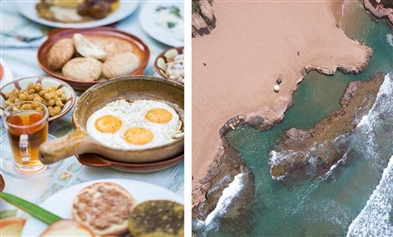


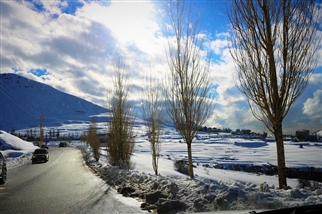
-151029114153325.jpg)
-150908103833282.jpg)

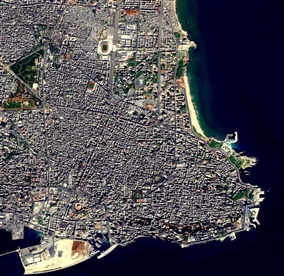
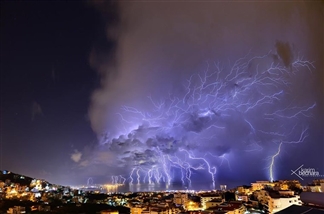
-140410013152695.jpg)
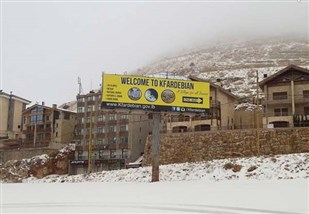
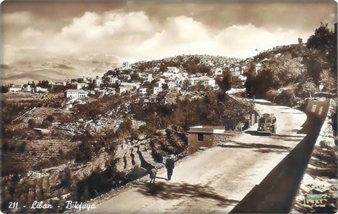
-131205120123197.jpg)
